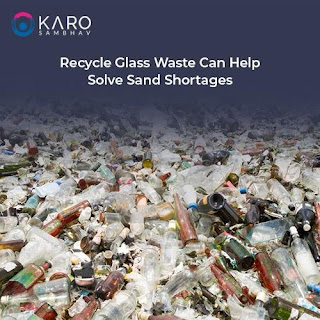Recycle Glass Waste can Help Solve Sand Shortages
Recently, there has been one element that is experiencing a dearth in production but also experiencing a rise in demand - construction sand. As a result, it is leading to the creation of a sustainable and affordable alternative that will eventually lead to circular economy. Moving ahead, glass waste is a byproduct of natural sand and can be a substitute for natural sand. Crushed glass waste might show geotechnical behaviour (properties) comparable to the latter.
Utilising crushed waste glass by incorporating proper glass waste management as a substitute for traditional sand could lead to a double-duty benefit by directing the geo-environmental concerns of natural sand depletion and disposal of ever-increasing waste glass.
The Sand Scarcity: An Imminent Danger
We tend to take sand for granted but it's the cornerstone of the contemporary world. An essential building element, concrete, needs a lot of sand. Furthermore, sand is utilised in electronics and asphalt. Sadly, the amount of sand we use has overtaken how quickly it naturally replenishes.
Unsustainable mining methods have thrown ecosystems off balance and accelerated coastal erosion in riverbeds and beach areas. In some areas, this has even resulted in government prohibitions on the excavation of sand due to environmental concerns.
The lack of sand is having an already noticeable effect. There are delays in construction projects and rising costs for sand-based components. Development of infrastructure and general economic growth are so impacted.
Glass Waste Management: An Uncommon Treasure
Landfills receive millions of tonnes of glass waste annually since responsible recycling is not followed. Not only does this take up valuable space, but glass doesn't break down, thus there are environmental dangers. However, this waste can be a helpful instrument in addressing sand scarcity.
Silicon dioxide, a main ingredient in sand, makes up the majority of glass. Glass recycling is the process of crushing, cleaning, and processing waste glass to create a substance that resembles natural sand. Then, there are numerous uses for this recycled glass, sometimes referred to as cullet.
The Advantages of Recycling Glass to Replace Sand
Cullet construction has several advantages.
Decreased Dependency on Natural Sand: By employing cullet, we may lessen our reliance on virgin sand supplies considerably, reducing the harm that unsustainable mining causes to the environment.
Decreased Waste in Landfills: Recycling glass helps manage glass waste responsibly by keeping it out of landfills, which clears space and lowers pollution on the land.
Economy of Scale: Cullet processing can be less expensive than collecting virgin sand, particularly when transportation expenses are taken into account.
Eco-friendly Building: Utilising recycled resources such as cullet is consistent with sustainable building methods, hence promoting an environmentally conscious future for the sector.
Benefits of Waste Glass
Using crushed waste glass as a substitute for natural sand could offer two-prolonged environmental and economic benefits. This includes a reduction in greenhouse gas emissions due to quarrying activities, cutting down on a continuous demand for natural sand, conservation of sand reserves, reduced travelling time and distance of sand, and enhanced cost-effectiveness.
Overall, crushed waste glass could potentially serve as a substitute and smart-geo material, promoting the recycling of waste glass, minimizing the burden on landfills, and preserving natural resources. Karo Sambhav is a well-known organization that has consistently followed the approaches of responsible recycling. They also actively educate people on the importance of glass waste management. Therefore, if you are interested in gaining more knowledge about glass recycling, Karo Sambhav is the place to consult



Comments
Post a Comment